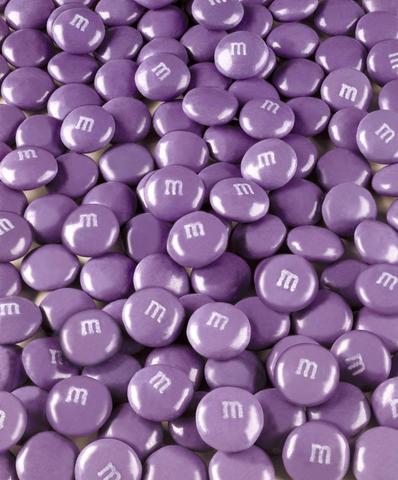How sweet it is.
More than 10 million M&Ms brand candy lovers in the US and 200 other countries have voted to add purple to the popular, button-like candy's rainbow of colors, manufacturer Masterfoods USA, a subsidiary of Mars, Inc, announced on Wednesday at a gala web-cast party in New York.

PHOTO: AP
"We're very excited about the turnout and consumer involvement with M&Ms," Masterfoods USA president Paul Michaels said. Purple won, Michaels said, because "It's a popular color, it's a royal color. People love it around the world."
The new color garnered 41 percent of the vote, beating out aqua's 37 percent and pink's 19 percent. It will appear in the product's crinkly brown bags in August, adding to blue, red, yellow, orange, brown and green.
Specially marked packages containing the three choices were available prior to May 31 when "the polls" closed for the company-sponsored Global Color Vote, the second such promotion and first to include votes from outside the US including Indonesia, Australia, Paris and China.
The candy's original six colors were brown, yellow, orange, red, green and violet, ousted in 1949 in favor of tan, in turn replaced in 1995 by US voters' choice of blue.
Mars Inc founder Forrest Mars Sr. created the candy in the late 1930s based on Spanish Civil War soldiers' hard sugar-encased chocolates. First marketed in 1941, M&Ms'similar ability to resist melting made it a staple food of World War II American GI's.
The candy, whose letters stand for Mars and co-founder Murrie, still boasts its 1954 slogan, "The milk chocolate that melts in your mouth, not in your hand."
In the heated, US$13 billion a year US chocolate market, M&Ms has to have a hard shell. It is the world's top single brand, according to Michaels, but faces fierce competition in America from Hershey's variety of chocolate products including Hershey bars and Reeses peanut butter cups, making Hershey's the top US confectionery brand, according to the Chocolate Manufacturers Association.

INVESTIGATION: The case is the latest instance of a DPP figure being implicated in an espionage network accused of allegedly leaking information to Chinese intelligence Democratic Progressive Party (DPP) member Ho Jen-chieh (何仁傑) was detained and held incommunicado yesterday on suspicion of spying for China during his tenure as assistant to then-minister of foreign affairs Joseph Wu (吳釗燮). The Taipei District Prosecutors’ Office said Ho was implicated during its investigation into alleged spying activities by former Presidential Office consultant Wu Shang-yu (吳尚雨). Prosecutors said there is reason to believe Ho breached the National Security Act (國家安全法) by leaking classified Ministry of Foreign Affairs information to Chinese intelligence. Following interrogation, prosecutors petitioned the Taipei District Court to detain Ho, citing concerns over potential collusion or tampering of evidence. The

‘FORM OF PROTEST’: The German Institute Taipei said it was ‘shocked’ to see Nazi symbolism used in connection with political aims as it condemned the incident Sung Chien-liang (宋建樑), who led efforts to recall Democratic Progressive Party (DPP) Legislator Lee Kun-cheng (李坤城), was released on bail of NT$80,000 yesterday amid an outcry over a Nazi armband he wore to questioning the night before. Sung arrived at the New Taipei City District Prosecutors’ Office for questioning in a recall petition forgery case on Tuesday night wearing a red armband bearing a swastika, carrying a copy of Adolf Hitler’s Mein Kampf and giving a Nazi salute. Sung left the building at 1:15am without the armband and apparently covering the book with a coat. This is a serious international scandal and Chinese

Seventy percent of middle and elementary schools now conduct English classes entirely in English, the Ministry of Education said, as it encourages schools nationwide to adopt this practice Minister of Education (MOE) Cheng Ying-yao (鄭英耀) is scheduled to present a report on the government’s bilingual education policy to the Legislative Yuan’s Education and Culture Committee today. The report would outline strategies aimed at expanding access to education, reducing regional disparities and improving talent cultivation. Implementation of bilingual education policies has varied across local governments, occasionally drawing public criticism. For example, some schools have required teachers of non-English subjects to pass English proficiency

TRADE: The premier pledged safeguards on ‘Made in Taiwan’ labeling, anti-dumping measures and stricter export controls to strengthen its position in trade talks Products labeled “made in Taiwan” must be genuinely made in Taiwan, Premier Cho Jung-tai (卓榮泰) said yesterday, vowing to enforce strict safeguards against “origin laundering” and initiate anti-dumping investigations to prevent China dumping its products in Taiwan. Cho made the remarks in a discussion session with representatives from industries in Kaohsiung. In response to the US government’s recent announcement of “reciprocal” tariffs on its trading partners, President William Lai (賴清德) and Cho last week began a series of consultations with industry leaders nationwide to gather feedback and address concerns. Taiwanese and US officials held a videoconference on Friday evening to discuss the